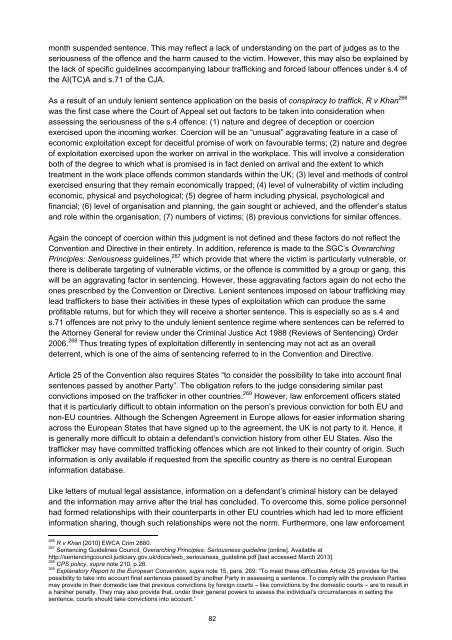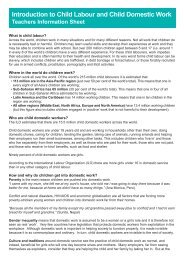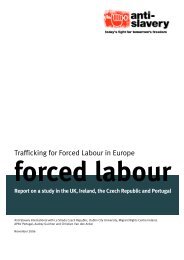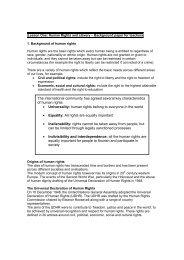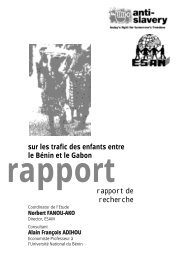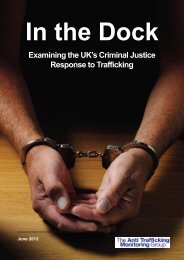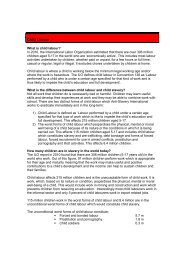month suspended sentence. This may reflect a lack of understanding on <strong>the</strong> part of judges as to <strong>the</strong>seriousness of <strong>the</strong> offence and <strong>the</strong> harm caused to <strong>the</strong> victim. However, this may also be explained by<strong>the</strong> lack of specific guidelines accompanying labour trafficking and forced labour offences under s.4 of<strong>the</strong> AI(TC)A and s.71 of <strong>the</strong> CJA.As a result of an unduly lenient sentence application on <strong>the</strong> basis of conspiracy to traffick, R v Khan 266was <strong>the</strong> first case where <strong>the</strong> Court of Appeal set out factors to be taken into consideration whenassessing <strong>the</strong> seriousness of <strong>the</strong> s.4 offence: (1) nature and degree of deception or coercionexercised upon <strong>the</strong> incoming worker. Coercion will be an “unusual” aggravating feature in a case ofeconomic exploitation except for deceitful promise of work on favourable terms; (2) nature and degreeof exploitation exercised upon <strong>the</strong> worker on arrival in <strong>the</strong> workplace. This will involve a considerationboth of <strong>the</strong> degree to which what is promised is in fact denied on arrival and <strong>the</strong> extent to whichtreatment in <strong>the</strong> work place offends common standards within <strong>the</strong> UK; (3) level and methods of controlexercised ensuring that <strong>the</strong>y remain economically trapped; (4) level of vulnerability of victim includingeconomic, physical and psychological; (5) degree of harm including physical, psychological andfinancial; (6) level of organisation and planning, <strong>the</strong> gain sought or achieved, and <strong>the</strong> offender’s statusand role within <strong>the</strong> organisation; (7) numbers of victims; (8) previous convictions for similar offences.Again <strong>the</strong> concept of coercion within this judgment is not defined and <strong>the</strong>se factors do not reflect <strong>the</strong>Convention and Directive in <strong>the</strong>ir entirety. <strong>In</strong> addition, reference is made to <strong>the</strong> SGC’s OverarchingPrinciples: Seriousness guidelines, 267 which provide that where <strong>the</strong> victim is particularly vulnerable, or<strong>the</strong>re is deliberate targeting of vulnerable victims, or <strong>the</strong> offence is committed by a group or gang, thiswill be an aggravating factor in sentencing. However, <strong>the</strong>se aggravating factors again do not echo <strong>the</strong>ones prescribed by <strong>the</strong> Convention or Directive. Lenient sentences imposed on labour trafficking maylead traffickers to base <strong>the</strong>ir activities in <strong>the</strong>se types of exploitation which can produce <strong>the</strong> sameprofitable returns, but for which <strong>the</strong>y will receive a shorter sentence. This is especially so as s.4 ands.71 offences are not privy to <strong>the</strong> unduly lenient sentence regime where sentences can be referred to<strong>the</strong> Attorney General for review under <strong>the</strong> Criminal Justice Act 1988 (Reviews of Sentencing) Order2006. 268 Thus treating types of exploitation differently in sentencing may not act as an overalldeterrent, which is one of <strong>the</strong> aims of sentencing referred to in <strong>the</strong> Convention and Directive.Article 25 of <strong>the</strong> Convention also requires States “to consider <strong>the</strong> possibility to take into account finalsentences passed by ano<strong>the</strong>r Party”. The obligation refers to <strong>the</strong> judge considering similar pastconvictions imposed on <strong>the</strong> trafficker in o<strong>the</strong>r countries. 269 However, law enforcement officers statedthat it is particularly difficult to obtain information on <strong>the</strong> person’s previous conviction for both EU andnon-EU countries. Although <strong>the</strong> Schengen Agreement in Europe allows for easier information sharingacross <strong>the</strong> European States that have signed up to <strong>the</strong> agreement, <strong>the</strong> UK is not party to it. Hence, itis generally more difficult to obtain a defendant’s conviction history from o<strong>the</strong>r EU States. Also <strong>the</strong>trafficker may have committed trafficking offences which are not linked to <strong>the</strong>ir country of origin. Suchinformation is only available if requested from <strong>the</strong> specific country as <strong>the</strong>re is no central Europeaninformation database.Like letters of mutual legal assistance, information on a defendant’s criminal history can be delayedand <strong>the</strong> information may arrive after <strong>the</strong> trial has concluded. To overcome this, some police personnelhad formed relationships with <strong>the</strong>ir counterparts in o<strong>the</strong>r EU countries which had led to more efficientinformation sharing, though such relationships were not <strong>the</strong> norm. Fur<strong>the</strong>rmore, one law enforcement266R v Khan [2010] EWCA Crim 2880.267Sentencing Guidelines Council, Overarching Principles: Seriousness guideline [online]. Available athttp://sentencingcouncil.judiciary.gov.uk/docs/web_seriousness_guideline.pdf [last accessed March 2013].268CPS policy, supra note 210, p.28.269Explanatory Report to <strong>the</strong> European Convention, supra note 15, para. 269: “To meet <strong>the</strong>se difficulties Article 25 provides for <strong>the</strong>possibility to take into account final sentences passed by ano<strong>the</strong>r Party in assessing a sentence. To comply with <strong>the</strong> provision Partiesmay provide in <strong>the</strong>ir domestic law that previous convictions by foreign courts – like convictions by <strong>the</strong> domestic courts – are to result ina harsher penalty. They may also provide that, under <strong>the</strong>ir general powers to assess <strong>the</strong> individual’s circumstances in setting <strong>the</strong>sentence, courts should take convictions into account.”82
officer stated that not all judges recommend <strong>the</strong> deportation of EU-nationals after serving <strong>the</strong>irsentence which is permissible under European Citizens Directive (2004/38/EC) on <strong>the</strong> grounds ofpublic policy, public security or public health. This needs to be addressed to come into line with <strong>the</strong>Convention, which could be addressed through training for judges.Complexity of trafficking trialsVictim-WitnessPsychosocial consequences of trafficking can affect a trafficked person’s ability to act as a witness.<strong>In</strong>sufficient support including counselling, and a failure to deal with o<strong>the</strong>r pressing issues, such asunresolved immigration status, can impede victim’s willingness to testify. The nature of trauma makesvictim-witnesses unpredictable. They may also become disinterested or unwilling to participate as <strong>the</strong>yare intimidated by traffickers; <strong>the</strong>y may be too scared or unwell to testify, or <strong>the</strong>y may have decidedto return home in <strong>the</strong> time it has taken for <strong>the</strong> case to come to trial.<strong>In</strong> one case of forced labour, <strong>the</strong> contact and support for <strong>the</strong> victim was not maintained, resulting in anunsuccessful prosecution. The case involved <strong>the</strong> CPS deciding to solely indict for s.71 of <strong>the</strong> CJA,despite <strong>the</strong>re also being offences under s.12 of <strong>the</strong> Gangmasters (Licensing) Act (G(L)A) 2004. 270This decision was taken on <strong>the</strong> basis that s.71 carried a significantly higher sentence (14 years asopposed to 12 months under s.12 of <strong>the</strong> G(L)A). However, <strong>the</strong> victim-witness failed to attend court,which meant that without <strong>the</strong>ir evidence <strong>the</strong> case collapsed.Participants raised victimless or evidence-based prosecutions, similar to those in <strong>the</strong> context ofdomestic violence, as an option to bypass secondary trauma caused by testifying in court ,or in <strong>the</strong>event that <strong>the</strong> victim withdraws <strong>the</strong>ir support before trial. Whilst <strong>the</strong>re are a very small number ofvictimless prosecutions under trafficking legislation, this route was not regularly pursued, as it requiresextensive resources to ga<strong>the</strong>r <strong>the</strong> necessary evidence. The resource cuts discussed in Chapter 5make this option mostly untenable. This, and <strong>the</strong> case above, illustrates <strong>the</strong> indispensability of victimsupport throughout <strong>the</strong> criminal proceeding and <strong>the</strong> use of additional alternative charges in <strong>the</strong> case in<strong>the</strong> event that <strong>the</strong> victim withdraws <strong>the</strong>ir support at a late stage.Psychological complications can also affect victim testimony. Ideally it is advantageous to presentwitnesses who are articulate and consistent who testify, from start to finish, with composure. However,it is commonplace for trafficked persons’ accounts to be inconsistent (see Chapter 5), and <strong>the</strong> defencecounsel and juries may equate <strong>the</strong>se inconsistencies to lies. These difficulties can only be mitigatedthrough tailored and steady support for <strong>the</strong> witness; toge<strong>the</strong>r with <strong>the</strong> prosecuting advocates’ accurateexplanation of <strong>the</strong> victim’s condition to <strong>the</strong> jury.Defence strategyArticle 12 of <strong>the</strong> Directive requires that, without prejudice to <strong>the</strong> defence and with consideration of <strong>the</strong>victims’ personal circumstances, Member States shall ensure <strong>the</strong> implementation of measures thatavoid secondary victimisation, in accordance with law and rules of judicial discretion. Specifically, <strong>the</strong>provision set out in Article 12.4 (d) prohibits “unnecessary questioning concerning <strong>the</strong> victim’s privatelife”.Participants were concerned as to how this could be achieved in <strong>the</strong> UK context of an adversarialsystem, as such use of questions were seen as part of <strong>the</strong> defences’ right to thoroughly test <strong>the</strong>evidence against <strong>the</strong>m so that <strong>the</strong>y receive a fair trial, and any resulting conviction is robust. This hasbeen interpreted as attacking <strong>the</strong> victim’s credibility, suggesting that <strong>the</strong>ir allegations are unfoundedand <strong>the</strong>y have ulterior motives for bringing <strong>the</strong> case, such as gaining asylum, compensation, improvedliving conditions or even attention. The benefits deriving from <strong>the</strong> NRM were also argued to act as270Offences: acting as a gangmaster, being in possession of false documents etc.83
- Page 1 and 2:
In the DockExamining the UK’s Cri
- Page 3 and 4:
AcknowledgementsThis report was mad
- Page 5 and 6:
PrefaceIn May 2009, a group of nine
- Page 7 and 8:
Misconceptions around exploitation
- Page 9 and 10:
Acronyms and abbreviations frequent
- Page 11 and 12:
Executive SummaryIn the Dock is The
- Page 13 and 14:
Furthermore, the current legislatio
- Page 15 and 16:
The ATMG was made aware of some cas
- Page 17 and 18:
• Introduce mandatory child-speci
- Page 19 and 20:
• The UK’s ability to meet the
- Page 21 and 22:
Traffickers’ primary motivation i
- Page 23 and 24:
• Money launderers - turn profits
- Page 25 and 26:
out to perpetuate the exploitative
- Page 27 and 28:
[their] own enslavement” is as fu
- Page 29 and 30:
Chapter 2: UK Anti-Trafficking Legi
- Page 31 and 32:
nationals who commit trafficking of
- Page 33 and 34: Like the SOA, the “act” element
- Page 35 and 36: (b) D requires another person to pe
- Page 37 and 38: Forced or compulsory labourThe defi
- Page 39 and 40: ConclusionAs a consequence of the s
- Page 41 and 42: concerningly, the number of convict
- Page 43 and 44: women who were recruited in Poland
- Page 45 and 46: Chapter 4: Identifying trafficking
- Page 47 and 48: Misconceptions around exploitationT
- Page 49 and 50: espond inadequately to a trafficked
- Page 51 and 52: multi-agency teams was described by
- Page 53 and 54: Josie Connors. 179 In summary, inte
- Page 55 and 56: defending a trafficked person for f
- Page 57 and 58: “[B]ecause the NRM decision is on
- Page 59 and 60: PTSD. 196 A Consultant Psychiatrist
- Page 61 and 62: etween the client and the police, i
- Page 63 and 64: Regular communication needs to be s
- Page 65 and 66: Priority planningA particular issue
- Page 67 and 68: Chapter 6: Multi-agency and interna
- Page 69 and 70: canvassing for tarmacking opportuni
- Page 71 and 72: Despite this, it would appear that
- Page 73 and 74: Good practice - Operation Golf 229O
- Page 75 and 76: Chapter 7: Criminal proceedingsThe
- Page 77 and 78: Law enforcement working on the case
- Page 79 and 80: trafficking require particular unde
- Page 81 and 82: JuryPractitioners suggested that th
- Page 83: years”. 258 Ambiguity within the
- Page 87 and 88: jurors to be assisted with expert e
- Page 89 and 90: Good feedback was received from sem
- Page 91 and 92: The Convention does recognise that
- Page 93 and 94: Another option for trafficked victi
- Page 95 and 96: There are two models with respect t
- Page 97 and 98: 1. Is there clear evidence that the
- Page 99 and 100: decision can be taken into account
- Page 101 and 102: also entails being “alert to the
- Page 103 and 104: In some cases concerns were even ra
- Page 105 and 106: Chapter 9: Prosecuting child traffi
- Page 107 and 108: However, many children are not refe
- Page 109 and 110: trafficking”. 352 It states: “W
- Page 111 and 112: Previous research has found that th
- Page 113 and 114: children as well as assisting in pr
- Page 115 and 116: Child trafficking trainingThere is
- Page 117 and 118: were too traumatic to involve them
- Page 119 and 120: committed by a child whilst in a co
- Page 121 and 122: • Introduce mandatory child-speci
- Page 123 and 124: IdentificationThe PSNI is the main
- Page 125 and 126: participants suggest that this is b
- Page 127 and 128: The PPS stated that the reasons for
- Page 129 and 130: this research was aware of potentia
- Page 131 and 132: convictions of traffickers prosecut
- Page 133 and 134: Possibly in response to certain hur
- Page 135 and 136:
espectively. In addition to custodi
- Page 137 and 138:
Conclusion and RecommendationsThe A
- Page 139 and 140:
CRIMINAL PROCEEDINGS• Ensure that
- Page 141 and 142:
Crown Prosecution Service, Legal Gu
- Page 143 and 144:
Herman. J. Trauma and Recovery: The
- Page 145 and 146:
Annex I: Trafficking and other form
- Page 147 and 148:
(a) on summary conviction, to impri
- Page 149 and 150:
(b) which country is the country of
- Page 151 and 152:
2009 Istvan Kalocsai (Snr)MetS.57 o
- Page 153 and 154:
2009 causing actual bodily harm, su
- Page 155 and 156:
Skirmantas Kvedaras Feed, 2010 Rape
- Page 157 and 158:
2012 Ahdel Ali (24)Mubarek Ali (29)
- Page 159 and 160:
Annex III: The CPS’s Seven Stages
- Page 161 and 162:
159


